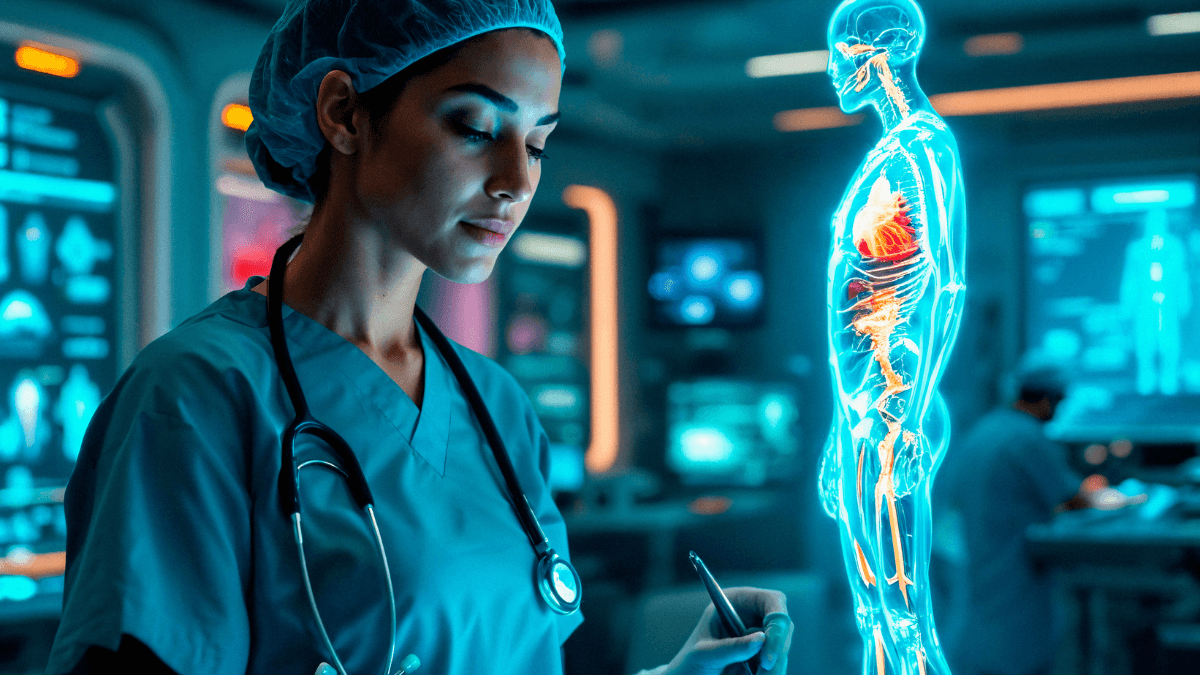
☝️ At a glance
- Medical education is changing fast as new tech reshapes how students learn and practice.
- Tools like simulations and adaptive platforms help students study better and gain safe clinical experience.
- They also improve diagnostic training, assessments, and real-world preparedness.
- But issues like over-reliance, ethics, data privacy, and limited infrastructure still need attention.
- The future lies in a balanced system where technology supports, but never replaces, human mentors and medical judgement.
Introduction: Artificial intelligence in medical education
AI in medical education was once futuristic, but the concept has evolved. AI is becoming a real thing and transforming the world of medicine. The use of artificial intelligence in medical education is reshaping how doctors are trained. The medical system is constantly evolving, and new research is conducted every day. As medical knowledge and the healthcare sector become more complex, traditional teaching methods often fall short. AI is not limited to medical education alone; it has a significant impact on the entire education system worldwide. The benefits of artificial intelligence in education lie in its ability to integrate technologies to ease the process and provide an effective approach. AI in medicine and healthcare sometimes combines technologies like virtual reality (VR) and offers tools for learning and clinical training.
In this article, we aim to cover how AI is used in medicine and healthcare education, and know the role, challenges, and future of AI in medicine

Become a global doctor with MBBS abroad!
Studying abroad can be affordable and stress-free with futureMBBS:
- World-recognized universities with English-taught programs
- On-site support in partner university cities
- Guaranteed placements & internships for hands-on experience
From selecting universities and supporting you with the application process to orientation and finding accommodation – we are at your side.
Why AI in medical education matters
Integrating AI into medical education isn’t just a “nice-to-have.” Many educators now treat it as essential for a future-ready curriculum:
Growing information load: Medicine changes fast, so the textbooks, research papers, treatment, and exams are constantly updating. AI plays a significant role here by keeping students updated on current trends. It also helps in finding the most relevant, up-to-date information. There are many AI training medical experts who help students understand big medical literature or patient data in the simplest way.
Individual learning pace: We all know that every student has their own approach and learning style. No one can learn at the same pace as others. AI-based adaptive learning systems provide personalized study paths that enable learners to identify areas where they are weak and need to work.
Practical clinical exposure without risk: Real patients, cadavers, or live surgeries are limited resources. AI-driven simulations and virtual patients give students a hands-on experience in a safe, repeatable, risk-free environment.
Where AI is already at work
Here are some of the main areas where AI and related tech are being used today. This was important because AI plays a bigger role in real medical practice, and doctors should know not only how to use it, but when and why to use it. Areas where AI is already implemented:
Intelligent tutoring systems
Many AI-based platforms offer customized question banks, learning modules, and reading material that fit each student. These help improve knowledge retention, making studying more efficient. It is useful in programs like MBBS or other medical courses. Not only this, but it also displays a student's report. It tells students about their learning, strengths, weaknesses, areas for improvement, and speed. It provides a full analytics-based report that is correct and reliable.
AI-powered simulations and virtual patients
AI also offers simulations, sometimes along with VR, that allow students to practice clinical skills without compromising patient safety. AI-based simulators are effective than traditional simulated patients for training skills. Many platforms use large language models to create patient-doctor simulations.
AI-assisted diagnostics and clinical training
Many AI tools provide deep learning or imaging/data analysis, helping teach diagnostic skills. Students working with AI-driven diagnostic aids can learn to interpret images or lab reports more accurately. Such training helps students develop critical clinical reasoning and interpretation skills before dealing with real patients.
Automated analytics
Nowadays, AI can also take assessments and evaluate clinical reasoning or medical skills. It can also predict which students might struggle and which students will do best in studies. This reduces the burden on faculty, speeds up the process, and helps make learning more efficient.
Curriculum integration
Medical schools know the importance of artificial intelligence, and many are offering courses and integrating it into the curriculum as a main subject. That shows training students on how to use AI is not enough; everyone must understand its strengths, limitations, and ethics.

Study medicine abroad with 100% support!
futureMBBS offers full support to make your dream of studying medicine abroad a reality.
- Hassle-free admission guidance
- Fast-tracked visa processing
- Post-arrival support, including accommodation assistance
Benefits and challenges
Benefits | Challenges |
|---|---|
AI tools help students learn at their own pace and adjust the difficulty level. | Most research is short-term and offers little insight into long-term outcomes. |
Simulations allow students unlimited practice without harming anyone. | Students may rely too much on AI, which can lead to weakening their critical thinking. |
By working through real-life scenarios, students can develop strong decision-making skills. | Storing student and simulation data in AI systems can be risky and may lead to misuse. |
AI automates assessments, creates learning materials, and summarizes complex topics, which saves faculty time. | AI requires good hardware, a stable internet connection, and trained faculty, which may not always be available. |
AI helps students and professionals stay updated with the latest research news and guidelines. | Human teachers are still needed for empathy and contextual understanding. |

Future of medical education with AI
The future of medical education with AI and technology seems promising. But to get it right, several things are important:
Every medical schools must integrate AI training into curricula, not as optional but as core subject. Many schools have already started offering AI electives.
We need to understand how AI-based learning affects competence, patient outcomes, clinical thinking over time, not just exam scores.
AI could be used for efficient, scalable learning and practice and humans for mentorship, empathy,judgment, and clinical insight.
To avoid widening disparities, there must be a focus on making AI-based education accessible also in resource-limited settings, through affordable platforms, offline-compatible tools, and minimal hardware demands.
Conclusion
The use of artificial intelligence in medical education is not a passing trend; it’s becoming a cornerstone of how future doctors learn, practise, and evolve. From AI-driven adaptive learning platforms, virtual patients, simulation-based clinical training, to automated assessment and diagnostic skill development, the applications are wide and powerful. For medical aspirants and educators, embracing AI in education is not optional anymore; it’s a step toward becoming healthcare professionals ready for a rapidly changing world.
Your medical career abroad starts here!
Thinking of pursuing MBBS abroad? Don’t just dream it, do it!
Start your MBBS journey!Frequently asked questions
Can I do AI after MBBS?
Yes, you can. Many doctors pursue AI, health informatics, or medical data science through certificates, diplomas, master’s programs, or online courses.
Can AI replace MBBS doctors?
No. AI can assist with diagnosis and tasks, but it cannot replace doctors’ clinical judgment, empathy, and decision-making.
What is AI in medicine course for doctors?
It’s a training program that teaches doctors how to use AI tools, understand algorithms, interpret data, and apply them in clinical practice safely.
Which AI is best for medical doctors?
Tools like IBM Watson, Google’s Med-PaLM, ChatGPT medical versions, and AI diagnostic platforms are commonly used depending on specialty.
Are doctors using AI now?
Yes. Doctors use AI for diagnostics, imaging, treatment planning, electronic records, and simulation-based training in many hospitals worldwide.




